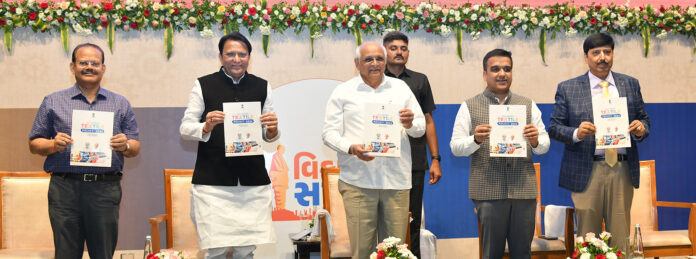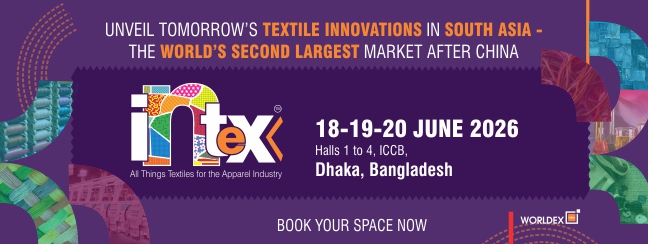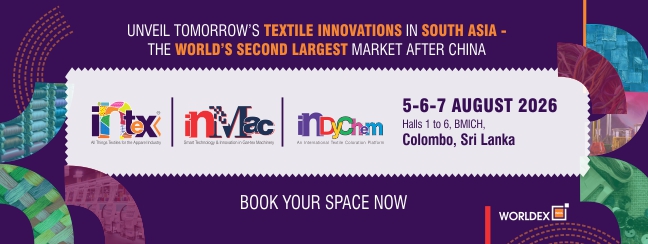Chief Minister Shri Bhupendra Patel launched the Gujarat Textile Policy 2024 on Entrepreneurship Day, as a part of the statewide celebration of Vikas Saptah. The CM conducted e-foundation stone laying for development projects valued at ₹418 crore and conducted the e-inauguration of projects worth ₹146 crore, including water supply, roads, and facilities in various industrial estates throughout the state. In the presence of Industries Minister Shri Balvantsinh Rajput, Minister of State for Industries Shri Harsh Sanghvi, and Chief Secretary Shri Raj Kumar, the Chief Minister distributed ₹1,100 crore in assistance to 5,500 industrial units under the Incentive to Industries program. The Chief Minister also issued a Letter of Intent for quarry leases valued at ₹699 crore during the Entrepreneurship Day Program at Mahatma Mandir in Gandhinagar.
Addressing the occasion, the Chief Minister mentioned that during his tenure as Chief Minister of Gujarat, Prime Minister Shri Narendra Modi set a new direction for the cotton industry and textile sector in 2012 by introducing the Five-F Formula-based textile policy: Farm to Fiber, Fiber to Fabric, Fabric to Fashion, and Fashion to Foreign. This initiative has fostered a robust ecosystem for the textile industry in the state, resulting in the establishment of 35 lakh spindles, an investment of ₹35,000 crore, and the creation of over 2.5 lakh employment opportunities. The Chief Minister stated that Gujarat’s development journey received renewed momentum on October 7, 2001, under the visionary leadership of Shri Narendra Modi as Chief Minister. We are currently celebrating Vikas Saptah from October 7 to 15 to commemorate 23 years of this success. The CM emphasized that Shri Narendra Modi has established a distinct identity for Gujarat as a policy-driven State, marked by sector-specific policies, an ease of-doing-business framework, and a proactive, industry-friendly approach.
During his tenure as Chief Minister, Shri Narendra Modi implemented various policies, including the Textile Policy, aimed at promoting employment growth in Gujarat’s textile industry. Building on the success of the 2012 textile policy introduced by Shri Narendra Modi, a five-year special policy for the garment and apparel industry was announced in 2017. Chief Minister Shri Bhupendra Patel indicated that after the implementation of the special policy in 2017, a new policy was introduced in 2019. These initiatives have significantly enhanced the textile industry in the state, leading to the creation of approximately five lakh direct and indirect jobs. While announcing the Textile Policy-2024, he pointed out that 40% of Gujarat’s fabric production is derived from man-made fibres, and the state contributes 25% of the total production of technical textiles. He stressed the vital role the textile industry plays in both the state’s economy and the nation’s overall economic advancement. In this context, the state government has adopted the new Textile Policy 2024, which aims to analyze each segment of the textile value chain, focusing specifically on garments, apparel, and technical textiles.
Chief Minister Shri Bhupendra Patel emphasized that, for the first time in the Textile Policy 2024, there is a commitment to enhance employment opportunities by prioritizing the empowerment and income generation of women’s self-help groups in both rural and urban areas. The Chief Minister announced that under the leadership of Prime Minister Shri Narendra Modi, the Textile Policy 2024 has been launched with a commendable objective: to position the textile sector as a vital contributor to helping India become the third-largest economy and to establish Gujarat as a significant contributor in achieving the goal of Viksit Bharat @ 2047. The CM noted that this new policy is anticipated to bring in approximately ₹30,000 crore in capital investment to the state in the future, aligning with the Prime Minister’s GYAN [Garib, Yuva, Annadata, Naari] approach. This policy aims to create employment opportunities for youth and women while maximizing benefits for cotton-producing farmers. The Chief Minister highlighted that the ecosystem fostered by the PM MITRA Park, the new textile policy and the comprehensive development of the textile value chain will pave the way for the realization of Viksit Gujarat. The CM also emphasized the importance of commemorating Vikas Saptah annually from October 7 to 15 for the next 23 years, leading up to 2047, to celebrate the significant development milestones achieved in the state over the past 23 years, from 2001 to 2023.
Industries Minister Shri Balvantsinh Rajput commended the decision to celebrate Vikas Saptah, stating that during his 13 years as Chief Minister of Gujarat and 10 years as Prime Minister, Shri Narendra Modi has consistently worked for the well-being of citizens and the development of the country, including Gujarat, without taking a single day off. The Prime Minister continues to make resolute, public-interest decisions in every field with a commitment to transforming India into a developed nation by 2047. The Industries Minister noted that the Vibrant Gujarat Global Summit, initiated under the Prime Minister’s vision, has resulted in Gujarat becoming a role model for development in India, inspiring numerous other states. He emphasized that Gujarat’s contribution to national development is vital, particularly in terms of employment. The state’s unemployment rate, which once stood at 4.2 per cent, has now decreased to just 2.7 per cent. Prime Minister Shri Narendra Modi has introduced over 20 policies aimed at fostering various sectors for the holistic development of Gujarat. In addition, numerous decisions have been taken to benefit more than 19 lakh industrialists within the state.
During this occasion, the Minister of State for Industries, Shri Harsh Sanghvi, remarked that Gujarat’s development journey began under Shri Narendra Modi’s leadership in 2001. The state’s GDP has seen remarkable growth, increasing from ₹1.42 lakh crore in 2002-03 to ₹22.61 lakh crore by 2022-23, exceeding the national average. Consequently, Gujarat has established itself as India’s growth engine and manufacturing hub. With the guidance of Prime Minister Shri Narendra Modi and the leadership of Chief Minister Shri Bhupendra Patel, Gujarat has achieved significant milestones in industrial production, employment, and exports, contributing over 18 per cent to the country’s overall production. In the fiscal year 2022-23, Gujarat’s exports reached ₹22 lakh crore, which represents 33 per cent of the nation’s total exports. The Minister credited this achievement to the people of Gujarat. Also in attendance were Shri M.K. Das, Additional Chief Secretary to the Chief Minister; Smt. Mamta Verma, Principal Secretary of the Industries and Mines Department; Shri Sandeep Sangle, Commissioner of Industries; senior officials; and a substantial number of industrialists.
Source: Information Department, Gujarat












